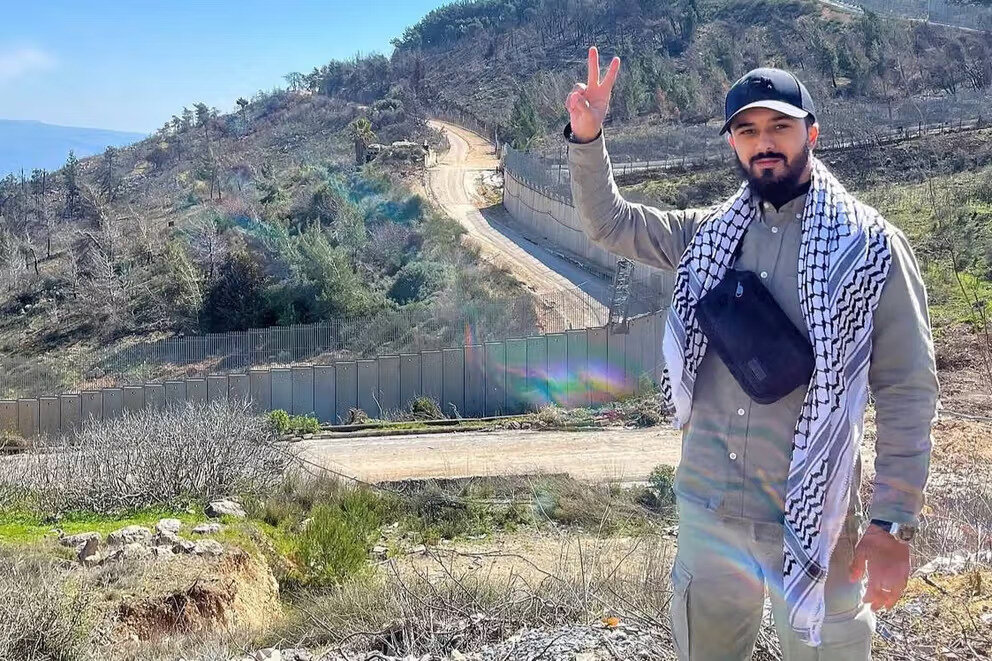TEHRAN – Shahin Hazami, a French Iranian journalist and outspoken defender of Palestinian rights, has intensified solidarity with Gaza, becoming France’s third Iranian citizen to be blocked in the last 18 months amid increasing criticism that Paris is exploiting anti-terrorist measures to target targeting advocacy.
His arrest is said to be part of a systematic campaign to challenge and unite the interests of the Israeli regime, following the controversial detention of Mahdieh Esfandiari and Bashir Biazar.
On Tuesday, 10 masked French security forces raided Hazamy’s Paris home, reportedly smashing a door and arresting him in front of his horrifying wife and two young children.
Witnesses described the operation as a “tears” and officers plundered the house and dragged Iranian citizens out without explaining it.
Hazamie, a freelance journalist known for recording Palestinian protests, has been facing judicial harassment since last year.
French security forces later in his social media posts he indicted him with “apologies du terrorism” (praises the actions of terrorists), but no formal evidence has been revealed.
Iranian filmmaker Mohsen Eslamizadeh, a close associate, revealed that “Shahin’s family had long reported threats from Zionist groups.”
In an interview with Iranian press, he explained days before his arrest, “how the Palestinian mother holding a bloody child at a Paris rally went viral and accumulated an astonishing “50 million views.”
Eslamzadeh continued by emphasizing that “this, coupled with his criticism of the illegal detention of France’s Mahdieh Esfandiari, targeted him.” His statement highlights the escalating risks faced by pro-Palestinian activists in a climate of intimidation and forced government tactics.
He also said that a French judge granted Hazamy’s temporary release before the trial, with a court hearing scheduled for two weeks.
Mahdieh Esfandiari: After disappearing, he was charged with supporting “terrorism”
Another incident includes Mahdier Esfandiari, a 39-year-old Iranian translator and lecturer at Lumiere University in Lyon, who disappeared on February 28th after French police attacked his home.
For weeks, her family didn’t receive an update until Le Point Magazine confirmed his detention at the Fresnes prison near Paris.
Authorities accused France of “apologies du terrorism” in an “apology” post that “praises” Palestinian resistance’s operation Al Axa Storm, which it allegedly “incited terrorism.”
Her case reflects previous tactics. Her house was left in chaos after the attack, and friends needed firefighters to break in when she disappeared.
French prosecutors later linked her arrest to a 2023 report by the National Online Hate Crime Center (PNLH), which flagged her social media activities.
Created in 2021 to combat online hate speech, PNLH is facing criticism that allegedly suppressed pro-Palestinian activity. It involved Collectiv Palestinian Vinecra in prosecuting unmoderated social media comments and trade unionist Anas Kajib for pro-Palestinian posts.
Esfandiari’s arrest shocked the Iranian diplomatic corps. Esmail Bakaei, a spokesman for Iran’s Ministry of Foreign Affairs, condemned the “medieval” treatment and said, “For 40 days, Esfandiari has been detained in solitary confinement without consul access or contact with her family.
Vahid Jalalzadeh, deputy director of the Consul, Congress and Iran’s Ministry of Foreign Affairs, is working on continued efforts to secure the release of Mahdieh Esfandiari, who was detained in France over his support for Palestine.
In X’s post Tuesday, Jalalzadeh said he met with members of Esfandiari’s family to discuss the situation.
“As part of my colleagues’ continued efforts, I met with members of Esfandiari’s family, claiming to be held hostage by the French government and defending freedom of expression in support of the oppressed people in Palestine,” he wrote.
He further reported that he provided the family with updates on the actions of the Ministry of Foreign Affairs and ensured that Iran would continue to work towards her release.
Bashir Biazar: Deported for “anti-French remarks”
Bashir Biazar, a 42-year-old Iranian journalist and former manager of the Iranian Broadcasting Republic (IRIB), experienced a similar challenge in June 2024.
He was arrested in Dijon and was detained for 28 days at the Mets under administrative detention prior to his deportation. French authorities have accused him of “anti-flash remarks” and “public agitation” over an Instagram post denounced Israel’s attack on Gaza.
Iran’s judiciary has condemned his detention as “illegal and human rights violations” especially after French officials blocked efforts to unite their families.
Biazar was released from detention in France in July 2024.
France’s “crashing culture” and the politics of silencing objections
The cases of Hazamy, Esfandiari, and Biazar highlight a broader pattern. Under the fight against anti-Semitism, France has confused anti-Zionism with terrorism and uses strict laws to curb criticism of Israeli atrocities.
In particular, France defended Charlie Hebd’s Islamophobic cartoon as “free speech,” but indicted Muslims and Iranian activists for solidarity with Palestine.
In a recent interview with Iranian media, Biazar has brought harsh criticism of Paris’ alliance growth with Tel Aviv.
“France has historically had close ties with the Israeli regime,” he argued, adding that these bonds have only been strengthened since October 2023.
According to Biazar, the French government has since launched an unprecedented crackdown on pro-Palestinian voices, targeting journalists, students and professors simultaneously with “medieval tactics.”
An Iranian journalist has given us the tragic accounts of the arrests, including Maddie Esfandiari and Shahin Hazami.
He argued that these oppressive behaviors were coordinated not only to suppress objections, but also to control the burgeoning anti-Zionist sentiment across France.
By silenced critics of Israel’s aggressive policies, France has essentially turned a blind eye to Gaza’s ongoing genocide, according to Biazar.
He further condemns the conspiracy between French authorities and Israeli forces, suggesting that France’s silence on Israeli actions reveals disturbing double standards.
Ultimately, instead of restraining the opposition, Biazar concluded that these measures only intensified public outrage and strengthened scrutiny of both French and Israeli policies.

